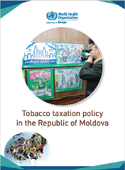Tobacco taxation policy in the Republic of Moldova (2017)

Download
This report on tobacco taxation in the Republic of Moldova gives an overview of tobacco taxation policy in the country for the period 2007–2016, estimates the impact of tobacco taxation policy on the country’s tobacco consumption and excise revenues, and proposes options for tobacco taxation policies. Over the period 2007–2016, three main stages of tobacco excise policy can be identified in the Republic of Moldova: (i) from 2007 to 2009 excise rates were very low and hardly increased at all; (ii) from 2010 to July 2013 all excise rates increased sharply (the specific rates increased more than fourfold and the ad valorem rates increased 10-fold); and (iii) from the second half of 2013 until 2016 specific rates for filter cigarettes increased 10-fold, while the ad valorem rate decreased by more than half.
The Republic of Moldova had a very beneficial experience with tobacco excise policy in 2010–2013. As a result the country has registered an eightfold revenue increase in four years; substantial decline in cigarette smuggling out of the country; and reduction of tobacco affordability and tobacco consumption. However, when the country changed its excise policy (July 2013) and adopted only very moderate excise increases (2014–2015), there was almost no revenue growth, while cigarette smuggling and tobacco affordability ceased to decline. If the Republic of Moldova maintains an excise policy of such minimal increases, the real (inflation-adjusted) excise revenue can only grow if tobacco consumption increases within the country. The Republic of Moldova could revive the aforementioned beneficial excise policy, which was in effect during 2010–2013. Such a policy can provide both the desired revenue increase and the required tobacco consumption decline, if it follows both the WHO Framework Convention on Tobacco Control guidelines and the provisions of European Union Directive EU 2011/64.



